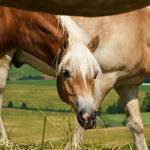Feed Management for Horses with Gastrointestinal Problems

While many horses get along well on pasture, hay, and grain, other groups of equines have special dietary needs because of specific health conditions. Horses with intestinal problems, kidney disease, or liver conditions fall into this group. Horses that have had portions of the small or large intestine removed also may require dietary adjustments.
Gastrointestinal disorders can be categorized into those affecting the small intestine (protein-losing enteropathies/malabsorption syndromes; “short-bowel syndrome” following surgical resection of intestine; and those involving the large intestine (colitis or diarrhea; colonic or cecal impaction; colon resection). With small intestinal diseases, the primary goal is to optimize large bowel digestive function. This can be achieved by feeding highly digestible fiber sources such as leafy alfalfa, beet pulp, or soybean hulls, with a reduction in grain feeding. Offering small grain meals of no more than two pounds (one kilogram) at a time may minimize the risk of passage of undigested starch into the hindgut.
Equines that have had more than 50% of the small intestine removed may suffer rapid and substantial weight loss without a major dietary adjustment. Horses with malabsorption syndromes will also tend to lose weight. These horses can sometimes be maintained on a diet of highly fermentable fiber (beet pulp and alfalfa) and fat (stabilized rice bran and vegetable oil).
Diarrhea in the adult horse is usually due to large intestinal dysfunction such as colitis secondary to bacterial infection. In the acute phase, many affected horses stop eating, though the digestive and absorptive functions in the small intestine are still fairly good. Therefore, low-residue diets with highly digestible sources of carbohydrate, protein, and fat should be fed.
As appetite improves, the diet should initially consist of hay and other sources of fermentable fiber. Yogurt cultures or commercially available bacterial preparations are often administered to aid reestablishment of normal microbial flora. There should be a gradual increase in grain feeding over a period of one to two weeks.
Kentucky Equine Research has developed EquiShure, a digestive health supplement designed for horses suspected of suffering from or at risk for hindgut acidosis. EquiShure helps horses maintain a stable hindgut environment to encourage proper digestion and absorption of nutrients. This product can be top-dressed onto feed and is often helpful for horses with inappetence, weight loss, and poor feed efficiency.








